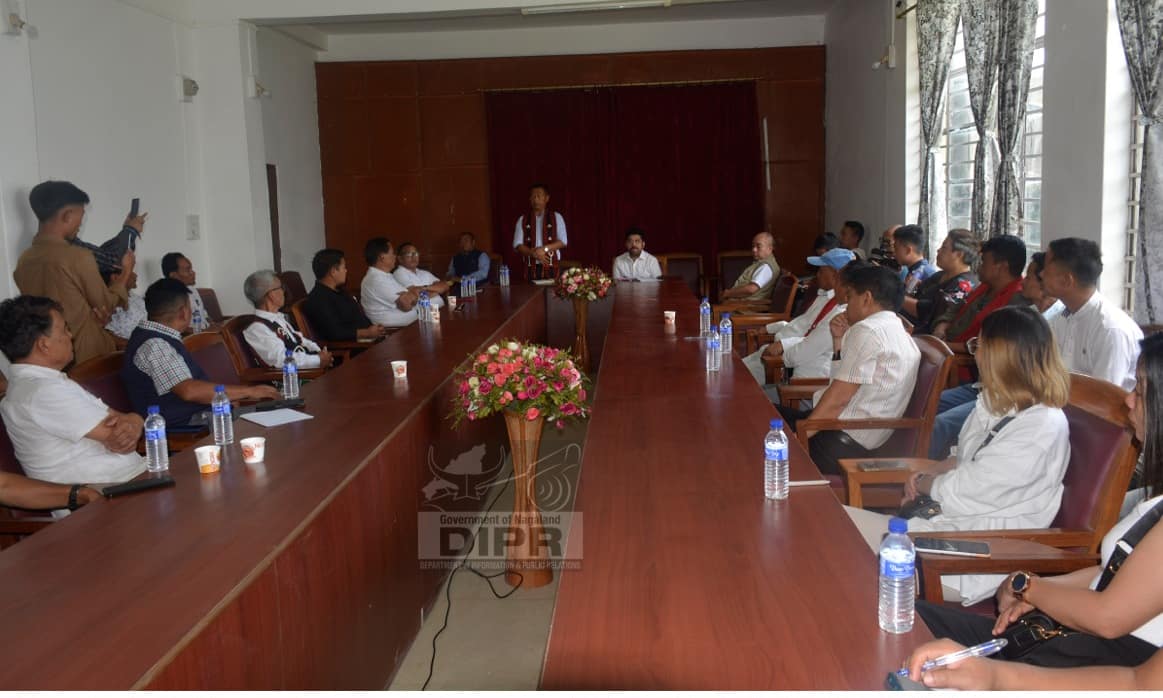KOHIMA, Jul 19: Dr. Kekhrielhoulie Yhome, the Advisor for School Education and SCERT, emphasised the value of recognising teachers for their commitment and sacrifices. He said this during his first visit to the Zunheboto area.
He remarked that teachers go above and beyond to serve in rural areas in spite of many challenges, such as lodging issues. The School Management Committees (SMCs), village GBs, and elders were urged by Dr. Yhome to recognise the difficulties teachers confront and offer their assistance.
His visit’s main goal was to learn about the opinions and hopes of the community on the School Education Department.
Dr. Yhome emphasised that, in contrast to larger departments, the education department is usually the topic of political debates, with the Director and Principal Director frequently coming under assault or becoming victims. He asked everyone to work with the Director and ask for help when necessary rather than pressuring their MLAs for transfer postings.
Dr. Yhome provided assurance that the department is working on restructuring the teachers’ deployment in response to a question posed by the president of the Eastern Sumi Student Union, who expressed concern over 61 teachers being transferred out of their areas in the previous five years and some schools having no teachers at all.
He promised that the government policy to ensure that the necessary number of teachers are present at government primary schools (GPS), government middle schools (GMS), government high schools (GHS), and government higher secondary schools (GHSS) will be implemented soon and he pleaded with all stakeholders for patience.
The Advisor emphasised that parents should give government schools for their children’s education serious consideration because of the skilled and experienced teachers who work there. He stressed that enrolling children in government schools not only saves money but also guarantees a high standard of education.
In addition, Dr. Yhome gave student leaders the task of determining how many kids between the ages of 3 and 8 were enrolled in colonies, blocks, or villages that provided free and mandatory schooling.
He is insistent that all children should be enrolled in school and required to go in order to avoid engaging in work or other activities.
Dr. Yhome spent his two days in Aghunato visiting several schools and interacting with locals in communities where government schools lacked teachers. At Circuit House Zunheboto, he also looked over the verification team for the Teachers Attendance Monitoring System (TAMS). Encouragement for the kids was also given during the advisor’s visit to the Government Higher Secondary School building’s construction site.
Meetings were held with representatives from various civil organisations, administrative officials, and the Zunheboto district’s Education Department staff. After the visit, Dr. Yhome and his group left for Satakha to check out the government higher secondary school, capping off their trip to Zunheboto.
Specific demands were made during a meeting presided over by Zunheboto Deputy Commissioner Rahul Bhanudas Malli, IAS, to expand the GHSS’s infrastructure, including adding physics and chemistry labs, and to think about launching a B.Sc. programme in science at Zunheboto College. Concerns were also expressed regarding the district’s paucity of maths and science instructors.
The Zunheboto Range Students’ Union (ZRSU), which sponsored 20 scientific students at GHSS, was congratulated by Director of School Education Wonthungo Tsope, who was accompanying the advisor, and was urged to maintain their assistance in the future. He made it clear that the goal of their visit was to ask for assistance from the community and emphasised the importance of prioritising enrolling kids in government schools with certified and experienced teachers.
In order to solve the scarcity in numerous schools, Zunheboto NDPP President Khehoshe Yeptho recommended that Hindi teachers be quickly recruited. It was also emphasised how crucial it is to incorporate sports within the academic programme. In order to provide instructors and children with a secure and hygienic learning environment, the Sumi Kukami Hoho stressed the significance of maintaining good school infrastructures. (DPRO & IA, Zunheboto)
